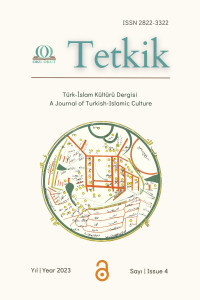Barış İnşası Çalışmalarının Din Sosyolojisi Bakış Açısından Değerlendirilmesi
Din Sosyolojisi, Barış, Din, Barış İnşası, Dini Aktör
Evaluation of Peacebuilding Studies from the Perspective of Sociology of Religion
Sociology of Religion, Peace, Religion, Peacebuilding, Religious Actor,
___
- Appleby, R. Scott. The Ambivalence of the Sacred: Religion, Violence, and Reconciliation. Lanham, MD: Rowman & Littlefield Publishers, 1999.
- Ardıç, Selin. “BM Barış Gücü”. Selçuk Üniversitesi Adalet Meslek Yüksekokulu Dergisi 5/1 (01 Temmuz 2022), 39-70. https://dergipark.org.tr/tr/pub/suamyod/issue/68603/1024682
- Aydınalp, Halil. “Sosyal Çatışma ve Din”. Uludağ Üniversitesi İlahiyat Fakültesi Dergisi 19/2 (01 Haziran 2010), 187-215. http://dergipark.org.tr/tr/pub/uluifd/162810
- Barash, David P. Approaches to Peace. New York: Oxford University Press, 4th edition., 2017.
- Berger, Peter L. (ed.). The Desecularization of the World: Resurgent Religion and World Politics. Washington, D.C.: Grand Rapids, Mich: Eerdmans, 1st Prin-ting., 1999.
- Boutros-Ghali, Boutros. An Agenda for Peace. UN, 1992. https://digitallibrary.un.org/record/145749
- Boutros-Ghali, Boutros. Supplement to an Agenda for Peace. UN, 1995. https://digitallibrary.un.org/record/168325
- Colective. The World Council of Religious Leaders. Bangkok, Tailand: The World Council, 2002. http://www.millenniumpeacesummit.org/
- Comte, Auguste. Pozitif Felsefe Dersleri. çev. Ümit Meriç. İstanbul: İstanbul Üniversitesi Edebiyat Fakültesi, 1967.
- Coward, Harold. Religion and Peacebuilding. ed. Gordon S. Smith. Albany: State University of New York Press, 2004.
- Çınar, Aliye. “Postmodern Teoloji”. Tabula Rasa: Felsefe-Teoloji IV/11 (2004), 41-53.
- Demir, Cenker Korhan. “Barışı Koruma”. Güvenlik Portalı. 2019. Erişim 30 Eylül 2022. https://trguvenlikportali.com/arastirma-2/guvenlik-yazilari/
- Düzgün, Şaban. “Din-Bilim İlişkisinde Modeller ve Ortak Kavramlar”. KADER Ke-lam Araştırmaları Dergisi 4/1 (25 Ocak 2009), 0-62. https://doi.org/10.18317/kader.09215
- Ebu Nimer, Mohammed. “Conflict Resolution, Culture, and Religion: Toward a Training Model of Interreligious Peacebuilding”. Journal of Peace Research 38/6 (2001), 685-704. https://www.jstor.org/stable/425559
- Emeklier, Bilgehan. “Uluslararası İlişkiler Disiplinininde Epistemolojik Paradig-ma Tartışmaları: Postpozitivist Kuramlar”. Bilge Strateji 3/4 (01 Haziran 2011), 139-184. https://dergipark.org.tr/tr/pub/bs/issue/3806/51043
- Frazer, Owen- Friedli, Richard. “Approaching Religion in Conflict Transformation: Concepts, Cases and Practical Implications”. Peacemakers (blog), 16 Eylül 2015. https://www.peacemakersnetwork.org/approaching-religion-in-conflict-transformation-concepts-cases-and-practical-implications/
- Galtung, Johan. A Pioneer of Peace Research. New York: Springer, 2013.
- Galtung, Johan. “Foreign Policy Pragmatism and Peace Movement Moralism: Can the Gap Be Bridged—or Tertium Non Datur?” Peace Movements and Paci-fism after September 11. ed. Shin Chiba- Thomas J. Schoenbaum. 173-183. Cheltenham, UK; Northampton, MA: Edward Elgar Publishing, 2008.
- Helmick, Raymond G.- Petersen, Rodney. “Does Religion Fuel or Heal in Conflicts?” Forgiveness & Reconciliation: Public Policy & Conflict Transformation. ed. Raymond G. Helmick- Rodney Petersen. Philadelphia: Templeton Press, 1905.
- Heywood, Andrew. Siyasî ideolojiler. çev. Ahmet Kemal Bayram. Ankara: Adres Yayınları, 2007.
- Jeong, H. Approaches To Peacebuilding. London & Newyork: Palgrave Macmillan, 2. Basım, 2002.
- Khaldun, Ibn. al-Muqaddimah. çev. Majid Al- Araki. Oslo: Pax, 2012.
- Kohn, Hans- Calhoun, Craig. The Idea of Nationalism. New Brunswick, N.J: Rout-ledge, 2005.
- Lederach, John Paul. Building Peace: Sustainable Reconciliation in Divided Socie-ties. Washington, D.C: United States Institute of Peace Press, 1998.
- Little, David- Appleby, Scott. “A Moment of Opportunity? The Promise of Religious Peacebuilding in an Era of Religious and Ethnic Conflict”. Religion and Peacebuilding. ed. Gordon S. Smith. Albany: State University of New York Press, 2004.
- Marx, Karl- Engels, Friedrich. Din Üzerine. çev. Murat Belge. İstanbul: Fol Kitap, 2. basım., 1841. Merriam-webster. Erişim 09 Kasım 2021. https://www.merriam-webster.com/dictionary/peace
- Mol, Hans. Identity and the Sacred: A Sketch for a New Social-Scientific Theory of Religion. Oxford: Blackwell, 1976.
- Murithi, Tim. The Ethics of Peacebuilding. Edinburgh: Edinburgh University Press, 2008.
- Okumuş, Ejder. “The Science of Umran, Conflict Resolution and Peace”. İbn Hal-dun Çalışmaları Dergisi 3/1 (Ocak 2018), 1-30. https://doi.org/10.36657/ihcd.2018.33
- Özerdem, Alpaslan. Barış İnşası Kuram ve Uygulaması. Ankara: Nobel Akademik Yayıncılık, 2013.
- Paris, Roland. “Peacebuilding and the Limits of Liberal Internationalism”. Inter-national Security 22/2 (1997), 54-89. https://doi.org/10.2307/2539367
- Peterson, Jenny H. vd. Building a Peace Economy? Liberal Peacebuilding and the Development-Security Industry. Manchester; New York: Manchester University Press, 2014.
- Philpott, Daniel. “Introduction: Searching for Strategy in an Age of Peacebuilding”. Strategies of peace: transforming conflict in a violent world. ed. Da-niel Philpott- Gerard F. Powers. Studies in strategic peacebuilding. New York: Oxford University Press, 2010.
- Sambur, Bilal. “Din Şiddet Üretir Mi?” Tarihi,Dinî, Siyasi, Kültürel, Sosyo-Psikolojik Boyutlarıyla. 99-108. Ankara: Kalkan Matbaacılık, 2016.
- Sandal, Nukhet A. Religious Leaders and Conflict Transformation: Northern Ire-land and Beyond. Cambridge New York Melbourne New Delhi Singapore: Cambridge University Press, 2017.
- Sarıkaya, Mehmet Emin. “Sosyal Çatışma ve Din: Matürîdî Düşüncede İzdüşümleri Üzerine Bir İnceleme”. Bingöl Üniversitesi İlahiyat Fakültesi Dergisi 16 (Aralık 2020), 356-369. https://doi.org/10.34085/buifd.810415
- TDK Sözlük. Erişim 09 Kasım 2021. https://sozluk.gov.tr/?kelime=barış
- Webel, Charles. Handbook of Peace and Conflict Studies. London: Routledge London and Newyork, 2009.
- Başlangıç: 2022
- Yayıncı: Oku Okut Derneği
Barış İnşası Çalışmalarının Din Sosyolojisi Bakış Açısından Değerlendirilmesi
Kurtubî’nin Morfolojik Temelli Anlam Arayışı
Akademik Dergilerde Kurullar: Yayın Kurulu – Danışma Kurulu
Gazzâlî Sonrası Felsefe Eleştirisi: Şihâbeddîn Ömer Sühreverdî Örneği
Eski Anadolu Türkçesi Dönemi Kur’an Tercümelerinde Gazâ Anlayışının Yansımaları
Alevî-Bektaşî Menâkıbnâmelerinde Renk Sembolizmi
İslam Felsefesi Perspektifinden Metaverse ve Misâl Âlemi Karşılaştırması
